Research
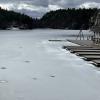 Using a 92-year record of ice freezing and thawing from Mohonk Lake in New York, Isabella Oleksy and her co-author David Richardson (SUNY New Paltz) uncover new insights into the relationship between changing ice cover and lake dynamics, with implications for bodies of water worldwide.
Using a 92-year record of ice freezing and thawing from Mohonk Lake in New York, Isabella Oleksy and her co-author David Richardson (SUNY New Paltz) uncover new insights into the relationship between changing ice cover and lake dynamics, with implications for bodies of water worldwide.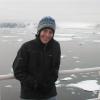 Alexandra Jahn speaks with KUNC's Erin O'Toole about her recent research to predict when the first ice-free day on the Arctic Ocean might occur. Jahn and her collaborator found that day could happen within the next 20 years – and possibly in as few as three years. An ice-free Arctic could significantly impact the ecosystem and Earth’s climate.
Alexandra Jahn speaks with KUNC's Erin O'Toole about her recent research to predict when the first ice-free day on the Arctic Ocean might occur. Jahn and her collaborator found that day could happen within the next 20 years – and possibly in as few as three years. An ice-free Arctic could significantly impact the ecosystem and Earth’s climate.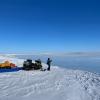 America’s largest annual earth sciences conference starts on Monday December 9th and will feature presentations from INSTAAR’s faculty fellows, faculty research associates, postdocs and students. More than 85 INSTAARs contributed to at least one abstract, with 37 of us involved in 3 or more abstracts. The most abstracts for one person is 17! It will be a busy week.
America’s largest annual earth sciences conference starts on Monday December 9th and will feature presentations from INSTAAR’s faculty fellows, faculty research associates, postdocs and students. More than 85 INSTAARs contributed to at least one abstract, with 37 of us involved in 3 or more abstracts. The most abstracts for one person is 17! It will be a busy week.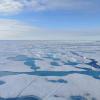 Alexandra Jahn and Céline Heuzé (University of Gothenburg) use computer models to show how a series of extreme weather events could lead to the Arctic’s first ice-free day within just a few years. An ice-free Arctic could significantly impact the ecosystem and Earth’s climate by changing weather patterns.
Alexandra Jahn and Céline Heuzé (University of Gothenburg) use computer models to show how a series of extreme weather events could lead to the Arctic’s first ice-free day within just a few years. An ice-free Arctic could significantly impact the ecosystem and Earth’s climate by changing weather patterns.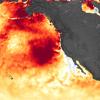 New research from INSTAAR PhD student Samuel Mogen, INSTAAR director Nicole Lovenduski, and collaborators could help protect marine life as climate change worsens. Their model is the first-ever forecasting tool for ocean acidification.
New research from INSTAAR PhD student Samuel Mogen, INSTAAR director Nicole Lovenduski, and collaborators could help protect marine life as climate change worsens. Their model is the first-ever forecasting tool for ocean acidification.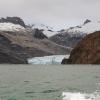 In an era of dwindling glaciers, Southern Patagonia has managed to hold on to a surprising amount of its ice. But, a new study in Scientific Reports from INSTAAR postdoc Matthias Troch and his colleagues suggests that this protective effect might be pushed up against its limits soon.
In an era of dwindling glaciers, Southern Patagonia has managed to hold on to a surprising amount of its ice. But, a new study in Scientific Reports from INSTAAR postdoc Matthias Troch and his colleagues suggests that this protective effect might be pushed up against its limits soon.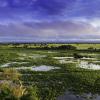 A new analysis from Sylvia Michel, Pieter Tans, Reid Clark, Jianghanyang (Ben) Li, and collaborators investigates the root cause of a recent atmospheric methane spike. While their finding suggests microbes have been emitting more methane than fossil fuels in recent years, reducing fossil fuel consumption remains key to addressing climate change.
A new analysis from Sylvia Michel, Pieter Tans, Reid Clark, Jianghanyang (Ben) Li, and collaborators investigates the root cause of a recent atmospheric methane spike. While their finding suggests microbes have been emitting more methane than fossil fuels in recent years, reducing fossil fuel consumption remains key to addressing climate change.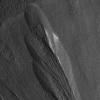 New computer modeling suggests meltwater beneath Martian ice could support microbial life. A team led by Aditya Khuller (NASA JPL) and including Gary Clow (INSTAAR) found that the amount of sunlight that can shine through water ice would be enough for photosynthesis to occur in shallow pools of meltwater below the surface of that ice.
New computer modeling suggests meltwater beneath Martian ice could support microbial life. A team led by Aditya Khuller (NASA JPL) and including Gary Clow (INSTAAR) found that the amount of sunlight that can shine through water ice would be enough for photosynthesis to occur in shallow pools of meltwater below the surface of that ice.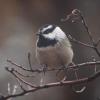 Mountain chickadees in Boulder have evolved a different tune to avoid getting mixed up with their black-capped cousins. The results provide real-time evidence for one of Charles Darwin’s famous theories and shed light on how pressure from human activity can impact wildlife’s evolution. The study was led by members of Scott Taylor's Lab.
Mountain chickadees in Boulder have evolved a different tune to avoid getting mixed up with their black-capped cousins. The results provide real-time evidence for one of Charles Darwin’s famous theories and shed light on how pressure from human activity can impact wildlife’s evolution. The study was led by members of Scott Taylor's Lab.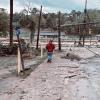 Have the norms of extreme weather in America changed? DFO Flood Observatory director Albert Kettner explains that catastrophic floods have become more common in the 21st century. The reasons behind this shift are complex — invoking climate change, urban infrastructure and human impacts on ecosystems and landscapes.
Have the norms of extreme weather in America changed? DFO Flood Observatory director Albert Kettner explains that catastrophic floods have become more common in the 21st century. The reasons behind this shift are complex — invoking climate change, urban infrastructure and human impacts on ecosystems and landscapes.

